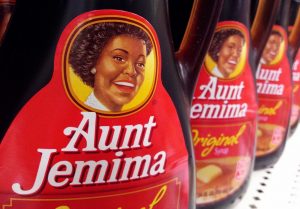Brand Ethics: Companies and Individuals Reevaluate Their Images
Published on September 30, 2020, at 6:30 p.m.
by Kendal Lambert.
Ethics is defined as the branch of knowledge that deals with moral principles. Companies and brands must band together all of the values they hold and want to represent. In today’s changing climate, some brands and individuals have taken a step back to reevaluate their overall images. Many found that what they were portraying to the public was not ethical and needed to be changed immediately.

What makes a brand ethical?
Companies with brands like Aunt Jemima are changing their names and advertising in hopes of making strides toward racial equality. According to The New York Times, Quaker Oats made the decision to change the Aunt Jemima brand name after Black Lives Matter protests broke out around the country. The brand that is 131 years old has slowly been making small changes to ultimately implement the name and advertising change in its company. The change also came from being scrutinized by individuals on social media who voiced that the brand was based on a racial stereotype and needed to change. Quaker Oats ultimately listened and made the change that it thought aligned with its company’s values.
A multitude of brands have recently taken a step back to evaluate what they can do to make society better and therefore have a good reputation. Many companies have taken their social responsibility to the next level. Buyers want their brands to be active in the community and voice what they believe in, hoping that brand activism will align with their values as well.
Patti Williams, marketing professor at The University of Pennsylvania, believes “brands will increasingly look to change elements of their brands that are potentially offensive… I expect that we will continue to see this trend.”
Not just brands have run into the issues of ethics. Musical acts such as The Dixie Chicks and Lady Antebellum fell under scrutiny in the last few months over their band names. The Dixie Chicks cut out “Dixie” and became “The Chicks.” The New York Times noted the name change came after individuals around the country pushed for the removal of certain confederate statues and monuments. The group accompanied the name change with a new music video to “March March,” showing images from protests for multiple causes, including women’s rights, gay rights and Black Lives Matter.
Lady Antebellum, also a country music native, changed their name to Lady A. The group made the announcement after acknowledging the word “antebellum” was associated with slavery. In a statement released by the band, they vowed that the name change would be the first of many steps they would take in practicing antiracism.
How does a brand or individual address social issues in a genuine and impactful way?
Williams noted “that both consumers and employees increasingly expect companies and brands to speak up around social issues. Axios recently collected data that indicates 61% of American consumers expect brands to speak up and that they trust companies to do so more than just the government to do so.”
However, Williams also mentioned that while speaking up is important, it is simply not enough. Consumers want action from companies, not long apologies that they will forget in a week or two.
What aspects make a wholesome apology?
Some individuals might feel that actions taken were simply just because the company felt pressure from the media. Becci Hart, president of public relations at the Intermark Group, believes it depends on the apology. She stated that to put forth a good apology, a company needs to address the “Why now?” component.
A good example of the “Why now?” theory would be the Washington Redskins. Individuals have been trying to convince them to change their mascot for years, and they had no interest in it. So, the “Why now?” component is important to explain to fans why they have decided to change things currently but not in the past.
Elise Anderson, president of Elicity Public Relations, said, “I think anyone can apologize — which is a start! But backing that apology up with true change and behavior that reflect the apology is necessary. Otherwise the apology is simply an empty statement.”
How does one reassure fans or buyers who have been offended?
A company or individual should always want to strive to have a consumer or fan base that is fully inclusive. If something has happened in the past that has tested that relationship, what is the best way to fix it?
Anderson said it is a tough subject because ultimately the artist or brand does not handpick the fan. The fan chooses them. It is up to the fan or consumer to decide with whom to connect. The best way to approach the situation is to think like the fan or potential consumer.
Many companies and organizations are starting to look internally at their morals and how they can be more socially responsible as a company. Hart noted, “It’s important to look internally at the same time you are looking externally.”
Hart mentioned how Nick Saban walked in the protest with his players on campus. Hart believes that supporting the things that are important to an organization’s key publics is always a good idea. It shows the organization cares.
As the social climate of the United States is rapidly changing, it is up to the consumers and fans to decide which brands and individuals hold the same morals as they do. So, what does ethics mean? People tend to view ethics as having a long, complex meaning. It is rather simple. Anderson said it eloquently: “Be a good human that both speaks and acts out of respect and kindness for others.”




